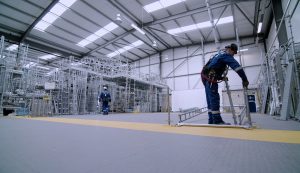Sky’s the limit with HAKI training

HAKI’s state-of-the-art training facility is well-known as a centre for excellence in practical and theoretical HAKI scaffold education. Whilst training is key to workers’ sense of professional development, the courses would be nothing without the experienced individuals that run them. Lester Brown, Barry Taylor, Chris Partridge and Martin Egan have countless years’ experience in the sector and are, well and truly, the bee’s knees when it comes to scaffold training. HAKI sat down with the instructors to speak about their experience and why now is the best time to join this rewarding sector.
Q: How long have you been instructors?
Martin Egan: I’ve been at HAKI for many years; I started in the yard, demonstrated the equipment, travelled around the world and then came into training. We all run the training courses and provide onsite support. We work well as a team and each know our strengths and weaknesses.
Lester Brown: We’ve all worked in the industry for what seems like a lifetime and know scaffolding like the backs of our hands. I’m a trainer and onsite support specialist and I’ve been at HAKI for around 11 years. I moved into training at the right time for me professionally and I’ve never looked back.
Barry Taylor: I have the same roles as Lester and have been at HAKI for six years now. Training was also the next step for me and I really enjoy it.
Chris Partridge: I’ve been an instructor for 21 years and I write/produce HAKI’s training courses.
Q: Who are the courses designed for?
Martin: The courses are for anyone with an interest – from novices coming in who want to work in scaffolding, right up to advanced scaffolders.
Lester: Our courses have really evolved over the years and are ideal for all abilities. The BASE course is a 5-day programme and is perfect for housebuilders and the like who want to turn their hand at scaffolding. Over the five days they learn how to build a structure that is six metres high. This enables them to build it using HAKI components, providing it doesn’t interface with the general public.
Chris: The BASE course is excellent for small builders. With so many of the scaffolding giants focusing on larger projects, for smaller work, this course is ideal.
Lester: Most of our trainees are existing scaffolders. They come to HAKI as their business has started to use our systems. We train them so they have advanced, technical skills to assemble the solutions. They can’t learn it anywhere else!
Q: Why is it important for workers to upskill?
Lester: The safety, speed and efficiency more than anything really. If you’re a housebuilder, you don’t have to wait for a contractor to come and erect the system – you can do it yourself.
Chris: As the courses are geared around HAKI’s systems, participants can learn about our solutions and gain more confidence when using the components. When they use them in real time, they are getting the very best out of the equipment.
Martin: Additionally, if they haven’t been trained and HAKI’s systems turn up onsite, scaffolders can use the system immediately. If they don’t know the components, it takes time to learn them. By coming on the training courses, they see the products first hand and learn the ropes from experienced, skilled professionals.
Q: How important is the follow-up onsite support?
Lester: We come in post-training to ensure the seamless transition from the centre to onsite work. HAKI training is like learning to drive, once you’ve mastered it, it becomes like second nature. There are a lot more variables in real life, so we help them to adapt.
Barry: It’s only when you are onsite and have to think for yourself that problems arise! As Lester said, it can be daunting to drive your car for the first time after qualifying. All of us have extensive background knowledge and experience. If anyone is struggling, we are there to guide them and give them the confidence to make sure they can do it.
Q: How did you adapt to the Covid restrictions?
Chris: Our first priority was safety. We moved to an open-air classroom and introduced a one-way system, and installed automatic hand sanitisers in key spaces. We also have track and trace. When a delegate arrives for a course the first procedure for them is to complete our Covid questionnaire and have their temperature taken. In order to stay open during lockdown, we had to make mask-wearing compulsory throughout the training centre and during practical tasks. Everyone is complying to the rules and it is working well. We haven’t had any indication of Covid being present over the past 12 months.
Q: What feedback do you get?
Chris: Because of our experience, we understand the scaffolders. We’ve come from all over the place, all walks of life including the military, so we can relate to a lot of people.
Q: Are you finding that more people are training now?
Chris: Our CISRS Operative Training Scheme (COTS) is so popular. It is the basic entry level scaffolding course for people who want to start as a scaffolder. I think the demand is there because people are coming into the building industry. We’ve been one of the lucky ones who have been resilient during the pandemic. It’s definitely the time to be in construction right now!
Q: What would be your advice to anyone thinking of doing training?
Barry: If someone wants to come for training, make sure you want to do it and are engaged. Scaffolding is a tough industry but there are loads of opportunities to grow. You have to love it!
Lester: You can come into this industry no matter where you’re from, and if you work hard there will be plenty of jobs for you.
 Haki has now acquired vertemax – Discover the
Haki has now acquired vertemax – Discover the 